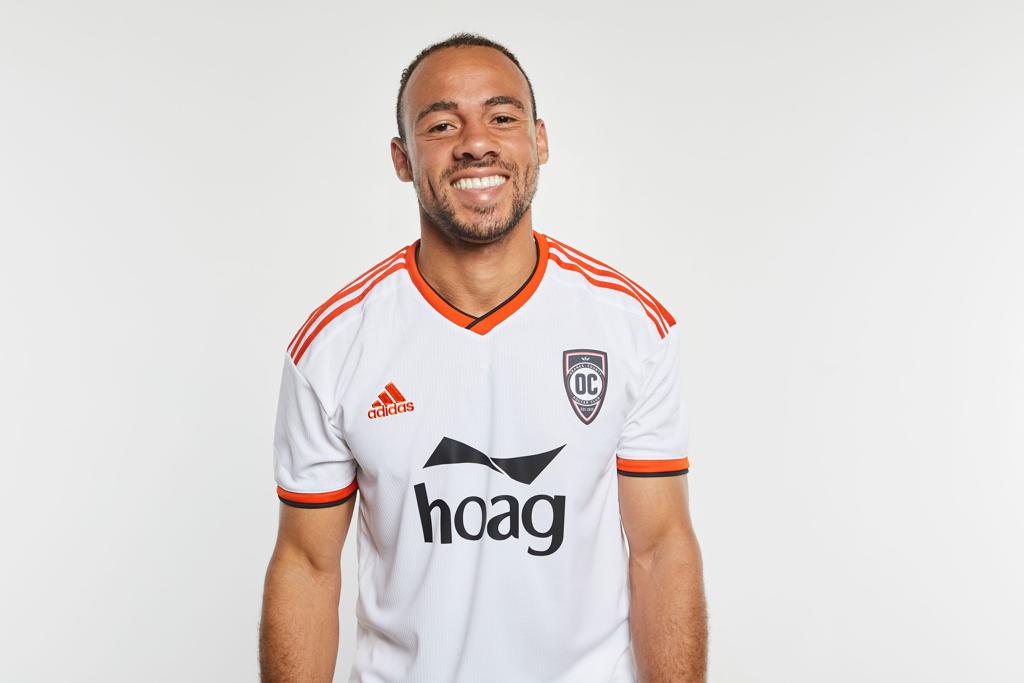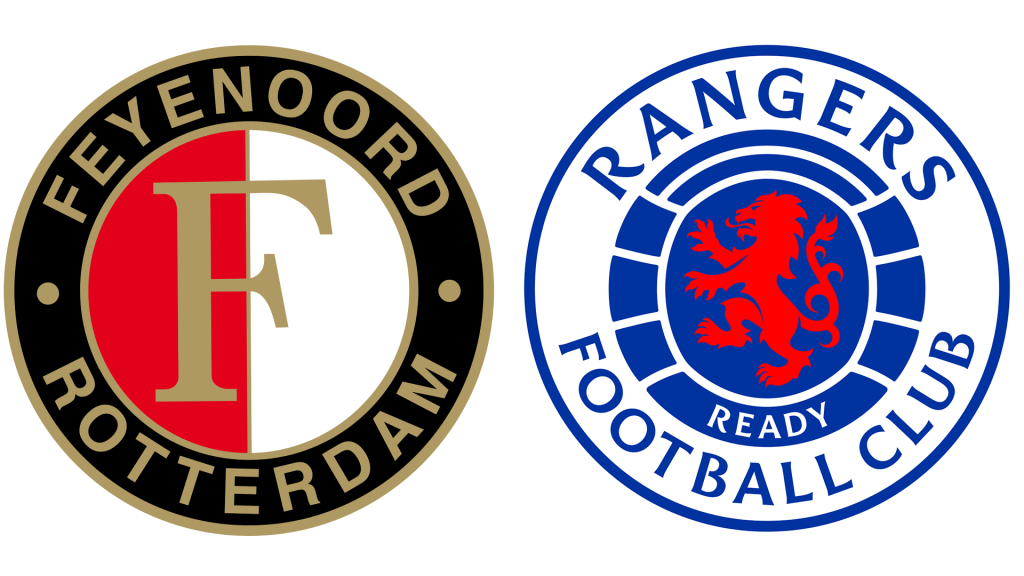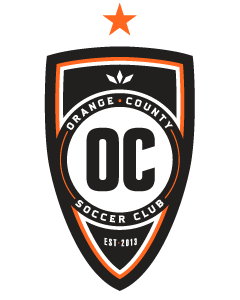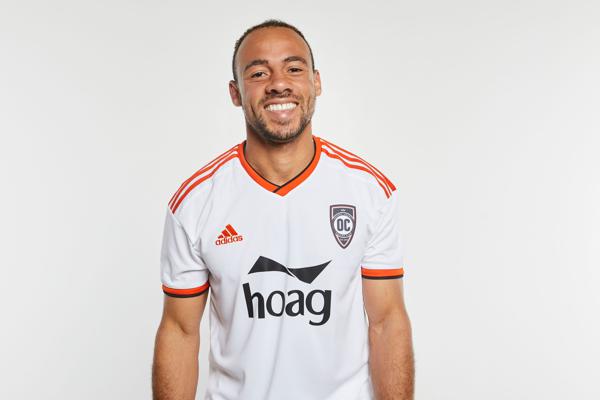The sun is always shining in Orange County, and that stands in stark contrast to the whims and winds of notoriously-fickle weather in New England.
Kevin Alston knows the latter all too well, having spent the formative years of his professional soccer career in Foxboro, Mass., sharing the same stadium halls and stalls as Tom Brady, Bill Belichick and Lombardi Trophies almost too numerous to count.
The sun is always shining in Orange County, and that stands in stark contrast to the whims and winds of notoriously-fickle weather in New England.
Kevin Alston knows the latter all too well, having spent the formative years of his professional soccer career in Foxboro, Mass., sharing the same stadium halls and stalls as Tom Brady, Bill Belichick and Lombardi Trophies almost too numerous to count.

Alston, of course, played a different brand of football from 2009-15 at Gillette Stadium, just a corner kick outside of Boston. As a member of the New England Revolution in the MLS, the defender from Indiana University had reached the pinnacle of his professional life.
For the past two years, Alston had dreamed and determined to get back to Major League Soccer. At 31, two years removed from his last day in the MLS with Orlando City, Alston believes he still has the game and the gumption to be successful at the highest level of professional soccer in the United States.
Always looking forward, always being prepared for life’s next steps, has been seared into Alston’s routine since that terrible day in April 2013, when he was told he had a rare, but treatable, form of cancer.
Largely in remission today, Alston still requires checkups every three months, benchmarks that could, at any time, reveal the disease’s return. It keeps the future very much in the front of his mind.
But in these past two years, Alston’s East Coast roots – he was born and raised in Washington, D.C. before joining the Revs – have begun to take hold in Orange County. Alston signed with Orange County SC in June 2018, and now in his second season, he feels as though he has found his home here, and he is happy to be in one place. Not least of which, he gets to play on real grass year-round.
“Coming off the end of 2017, I really wanted to be back in MLS. I knew I still had it in me,” Alston said Wednesday, as OCSC prepared for Saturday’s game against El Paso Locomotive FC at 7 p.m. at Championship Soccer Stadium. “I came out here, didn’t really have a plan, and ended up signing with this team, and it was great. I was able to continue playing and it was a great place to be, a great club, the staff, the coaches, everybody. I felt like I settled in very quickly, and I was happy to be here and happy to be playing.
“And my mentality now is just, every time I step on the field, I step on with passion. Sure, it would be great to play in the MLS, but at the same time, I have to be realistic and I’m happy here. When I step on the field, I enjoy the experience. Once I stop enjoying it, I’ll stop playing, but I still enjoy it.”
It was April Fools’ Day, of all days, in 2013, when Alston received the diagnosis that would change his life. If only it were a joke, Alston remembers thinking. Instead, Alston was a delivered truly sobering news. He was suffering from a rare form of cancer: Chronic myelogenous leukemia.
Rare, but treatable. Yes, Alston would have to step away from soccer for several months, but with proper treatment and hard work, it was not just treatable, but beatable. Just five months later, Alston was back on the field with the Revolution. He has been in remission ever since.
“When I do my bloodwork, it’s undetectable,” Alston said. “But that doesn’t mean it’s necessarily gone for good. It’s not cured. It’s just dormant. I try not to think about it too much. I try to enjoy every day. It changed my perspective a lot. You can’t take things for granted. I’m just happy to be playing in general.”
Alston, of course, was hardly alone in experiencing shock and sorrow in Boston in April 2013. Two weeks to the day after his diagnosis was the Boston Marathon. Alston was in Boston that Monday and remembers hearing the distant sound of the two explosions.
And while the city and the nation rallied together around the cry of “Boston Strong,” Alston too steeled his resolve. And as he beat his cancer and returned to the field of play, others found strength in his story.
“When it first happened, I never really looked at it from the perspective that other people are going through similar things and people can look up to me as inspirational — that he got over it and he’s still following his dreams,” Alston said. “At first, I didn’t look at it like that. Then I started talking to people and there were a lot of kids who were like, ‘I’m going through something similar. Your story is giving me inspiration.’ And it kind of clicked. I embrace it. I think it can be a source of inspiration for people going through similar things. If I can be that for just one person, that works for me.”
Alston, who was named an MLS All-Star back in 2010, played two more seasons with the Revs after his diagnosis, but the team declined his contract option in 2015. Alston was taken in the Re-Entry Draft by Orlando City, where he played for two seasons, but his final year in 2017 was marred by a hamstring injury that kept him sidelined the entire season.
From there, he made his way to Orange County, where this season he is fourth on the team with 37 clearances and five blocks from his fullback position.
“In the past few years alone, this league has really grown,” Alston said. “You’re seeing that it’s expanding pretty quickly and there’s a lot of players transitioning from MLS to the USL. Back in the day, it wasn’t as common. Now, the overall talent has gone up significantly in the USL. It would surprise a lot of people that the gap [between the MLS and USL] isn’t as far as you would expect it to be.
“A place like here is unique, because you have a lot of younger players who are all just starting out, trying to get to that next level, and I can help them any way I can, whether it’s motivation, tips, because I’ve been around. For me, personally, I’ve gotten to that point where there are some things you just can’t control. All I can do is step on the field and give it my all every time, and whatever happens from there, happens.
Alston, of course, played a different brand of football from 2009-15 at Gillette Stadium, just a corner kick outside of Boston. As a member of the New England Revolution in the MLS, the defender from Indiana University had reached the pinnacle of his professional life.
For the past two years, Alston had dreamed and determined to get back to Major League Soccer. At 31, two years removed from his last day in the MLS with Orlando City, Alston believes he still has the game and the gumption to be successful at the highest level of professional soccer in the United States.
Always looking forward, always being prepared for life’s next steps, has been seared into Alston’s routine since that terrible day in April 2013, when he was told he had a rare, but treatable, form of cancer.
Largely in remission today, Alston still requires checkups every three months, benchmarks that could, at any time, reveal the disease’s return. It keeps the future very much in the front of his mind.
But in these past two years, Alston’s East Coast roots – he was born and raised in Washington, D.C. before joining the Revs – have begun to take hold in Orange County. Alston signed with Orange County SC in June 2018, and now in his second season, he feels as though he has found his home here, and he is happy to be in one place. Not least of which, he gets to play on real grass year-round.
“Coming off the end of 2017, I really wanted to be back in MLS. I knew I still had it in me,” Alston said Wednesday, as OCSC prepared for Saturday’s game against El Paso Locomotive FC at 7 p.m. at Championship Soccer Stadium. “I came out here, didn’t really have a plan, and ended up signing with this team, and it was great. I was able to continue playing and it was a great place to be, a great club, the staff, the coaches, everybody. I felt like I settled in very quickly, and I was happy to be here and happy to be playing.
“And my mentality now is just, every time I step on the field, I step on with passion. Sure, it would be great to play in the MLS, but at the same time, I have to be realistic and I’m happy here. When I step on the field, I enjoy the experience. Once I stop enjoying it, I’ll stop playing, but I still enjoy it.”
It was April Fools’ Day, of all days, in 2013, when Alston received the diagnosis that would change his life. If only it were a joke, Alston remembers thinking. Instead, Alston was a delivered truly sobering news. He was suffering from a rare form of cancer: Chronic myelogenous leukemia.
Rare, but treatable. Yes, Alston would have to step away from soccer for several months, but with proper treatment and hard work, it was not just treatable, but beatable. Just five months later, Alston was back on the field with the Revolution. He has been in remission ever since.
“When I do my bloodwork, it’s undetectable,” Alston said. “But that doesn’t mean it’s necessarily gone for good. It’s not cured. It’s just dormant. I try not to think about it too much. I try to enjoy every day. It changed my perspective a lot. You can’t take things for granted. I’m just happy to be playing in general.”
Alston, of course, was hardly alone in experiencing shock and sorrow in Boston in April 2013. Two weeks to the day after his diagnosis was the Boston Marathon. Alston was in Boston that Monday and remembers hearing the distant sound of the two explosions.
And while the city and the nation rallied together around the cry of “Boston Strong,” Alston too steeled his resolve. And as he beat his cancer and returned to the field of play, others found strength in his story.
“When it first happened, I never really looked at it from the perspective that other people are going through similar things and people can look up to me as inspirational — that he got over it and he’s still following his dreams,” Alston said. “At first, I didn’t look at it like that. Then I started talking to people and there were a lot of kids who were like, ‘I’m going through something similar. Your story is giving me inspiration.’ And it kind of clicked. I embrace it. I think it can be a source of inspiration for people going through similar things. If I can be that for just one person, that works for me.”
Alston, who was named an MLS All-Star back in 2010, played two more seasons with the Revs after his diagnosis, but the team declined his contract option in 2015. Alston was taken in the Re-Entry Draft by Orlando City, where he played for two seasons, but his final year in 2017 was marred by a hamstring injury that kept him sidelined the entire season.
From there, he made his way to Orange County, where this season he is fourth on the team with 37 clearances and five blocks from his fullback position.
“In the past few years alone, this league has really grown,” Alston said. “You’re seeing that it’s expanding pretty quickly and there’s a lot of players transitioning from MLS to the USL. Back in the day, it wasn’t as common. Now, the overall talent has gone up significantly in the USL. It would surprise a lot of people that the gap [between the MLS and USL] isn’t as far as you would expect it to be.
“A place like here is unique, because you have a lot of younger players who are all just starting out, trying to get to that next level, and I can help them any way I can, whether it’s motivation, tips, because I’ve been around. For me, personally, I’ve gotten to that point where there are some things you just can’t control. All I can do is step on the field and give it my all every time, and whatever happens from there, happens.





























































































































































































































































































